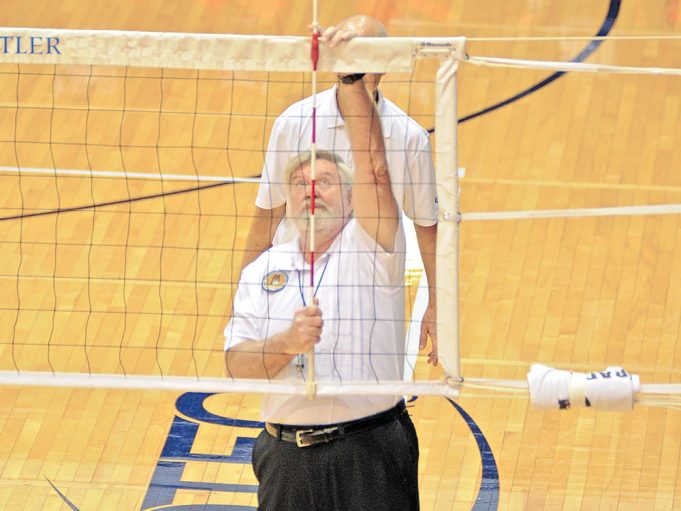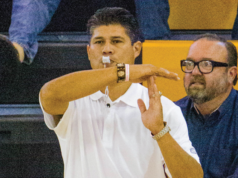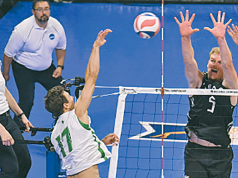As a young or newer referee works to master the art of officiating, she or he soon finds out that, while the rules are black and white, the game consists of a whole lot of grey.
When an attacker hits the ball into the top of the net and there are opposing blockers present, does the ball actually touch the block (thus giving the offensive team an additional three hits if it rebounds)? Or is that subsequent touch by the attacker’s team an illegal fourth contact?
When a player tries to retrieve a ball from the body of the net, is that contact really an illegal catch/throw? Or is it really multiple contacts and therefore not illegal on the first contact?
Where do you set the ball handling bar for a middle school match, a JV match, a high school varsity match or a college match?
All of those questions fall into that grey area of officiating, especially for less experienced officials. So how does one learn how to make the best decision possible in situations like those?
Some of the top collegiate volleyball conferences in the country include an observer. That person’s job is to watch the match and facilitate a post-match discussion about what went right and perhaps what went not-so-right. The observer also files a report with the conference assigner with his or her opinion on categories like consistency of ball handling judgment, communication skills and behavior control. So the top referees in the country are getting feedback every match, thus continuing to advance their skills.
Get feedback from an official whose opinion you trust
Newer officials need to do the very same thing. The rules of the game have changed over the years. So has the way officials are supposed to apply those rules. Get feedback from an official whose opinion you trust. For that matter, opinions from any official or observer can’t hurt. Feedback from your fellow officials is what allows you to stay abreast with what the generally accepted norms are in the officiating world.
Observe good officials at work. Watch what they call, especially in terms of judgment decisions like ball handling, and try to move your officiating performance in that direction. Ask for feedback from all of your officiating partners. Coaches, players and fans never lack opinions about how the match should be called, and officials should try to not let them influence their decisions in real time. However, if you are consistently getting pushback when you make a certain call, consider that perhaps they are right and you should adjust. Be mature enough to seek help with that call from fellow officials.
There is a learning curve that every young official must go through to master each of those “grey area” skills. Experienced officials can help you navigate that learning curve efficiently and most are more than willing to do so. Every referee needs to realize that when they stop trying to get better and decide to just coast through the rest of their career, they waste some of their talents as an official.
When mountain climbers have reached the top of Mount Everest, they have scaled the highest point in the world and there is no greater goal for them to seek. Until you have officiated a match at volleyball’s version of Mount Everest, there is always something you can do to take your skill set higher, and a match that is higher up the mountain.
Continually seek help and eagerly listen to input from your fellow officials. Every kind of input is good input. You can either file it in the “Wow. I think I’ll try that,” bin or the “That’s a lot of hooey” bin. One should be emptied slowly as you learn new skills, and the other can be flushed right after you process the suggestion. Either way, you still learn something from the exchange.
What's Your Call? Leave a Comment:
Note: This article is archival in nature. Rules, interpretations, mechanics, philosophies and other information may or may not be correct for the current year.
This article is the copyright of ©Referee Enterprises, Inc., and may not be republished in whole or in part online, in print or in any capacity without expressed written permission from Referee. The article is made available for educational use by individuals.


















